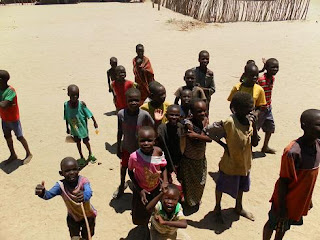Hi all! Happy Sunday! It’s been a long week here for us at TBI. We just finished our presentations and exams for our Paleontology class yesterday so everyone is really happy to be able to finally relax. Throughout the week, we went fossil hunting again and in one site we got to do a little bit of excavating and sieving. Sieving is a way of putting soil/sand into a net to pick out small fossils that might be missed by the naked eye. We all got really dusty and a bit sun burnt on that day but otherwise everyone had a lot of fun and is well and happy.
Sunday is a special day here for us all because it is the only day we get off, and you may wonder what DO we do around here on Sunday? Well it depends. Sometimes we go into town to restock on snacks, sometimes we go on mountain hikes, sometimes we go swimming by the lake, and on one weekend we even went into town to help plant some trees in remembrance of Kenya Nobel Prize winner, Wangari Maathai, so you can see aside from academic activities we also get exposed quite a bit to the local culture here. Interesting note, most of the locals here are Christian so a lot of the stores in town are closed on Sundays.
As for today I just decided to stay behind and relax with two other TBI students, and when the other students came back from town with the traditional kikoy cloths we couldn’t resist getting dressed up and getting lots of pictures. For those pictures please refer to fellow blogger Roy Lots’s post regarding today, and while you’re there Roy also has a fascinating interview with one  of our TBI staff members that’s well worth of reading (you can find his page here ).
of our TBI staff members that’s well worth of reading (you can find his page here ).
Picture time!
 TBI students and Meave Leakey at Esha, a late Miocene site.
TBI students and Meave Leakey at Esha, a late Miocene site. Students hovering over a sieve to pick out fossils.
Students hovering over a sieve to pick out fossils. Students sweeping the floor for fossils and sand to put into sieve.
Students sweeping the floor for fossils and sand to put into sieve.
Until next time! :)















